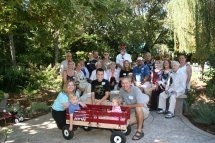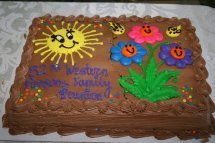Erika Mailman's Blog, page 21
September 24, 2010
My peeps!


A few weekends ago I had the true pleasure of meeting other Parsonses, at the Western Parsons Family Association. The group invited me to come speak about our ancestor in common, Mary Bliss Parsons, who was accused of witchcraft in 1600s Massachusetts.
This group all descends from a Parsons who came west on a wagon train in 1853...and then ultimately from Cornet Joseph Parsons, the first in our line in America (the husband of Mary Bliss Parsons). They are very knowledgeable about their genealogy and came equipped with tomes of family history.
I so much enjoyed meeting this wonderful group of people, who have met up annually for years. They made me feel right at home and seemed genuinely interested in Mary's witchcraft travails. Each year they make quilt squares and Harriet Parsons lovingly sews them into a beautiful quilt. She brought about 10 of the most recent years' and they were incredible works of art.
Here is our group (I'm sitting on the stone wall in a red shirt), and a picture of the sheet cake we all devoured.
I hadn't thought about Mary Bliss Parsons for a while... my book came out in 2007 and since then we've had two children and moved twice and... well, she just hasn't been on my mind. But boning up to do the talk, and then responding to the questions they raised, again filled me with enthusiasm to go to Northampton, Ma. to visit the family home, now a museum, and research more about this intriguing ancestor of mine. Someday!
.
.
.
August 18, 2010
Summer Reading Recommendations
Daughters of the Witching Hill by Mary Sharatt
This book is written with such lovely empathy that it radiates. Based on the details of the 1612 Pendle (England) witches trial, this novel follows Bess Southerns and her family as they scratch a living out of the hard soil. One source of income is doing "cunning" work: healing and magic. Which of course leads to trouble… imprisonment and the threat of execution.
I so sincerely don't believe in witchcraft, and am so enraged at how even today (read my archives) people are still being tortured and killed for the accusation of witchcraft, that it's a tough sell for me to accept a novel in which someone really does have powers. But Sharatt's light touch allowed me to immerse myself in this world.
An interview with Katherine Howe, another witchcraft author, reveals a key point for me. Sharatt says of one of her real-life characters:
Her last recorded words before she was hanged were a passionate vindication of her grandmother's legacy as a healer.
Clearly, these women did believe in their cunning powers, whether or not they truly existed. Sharatt's earnest and compassionate telling of their lives won over this initially hesitant reader, and I highly recommend this beautifully-told book.
The Children of Witches, by Sherri Smith.
Published in England and available here in the U.S. as a Kindle edition, this novel looks at the world of witchcraft in a medieval German town. Smith asked me for a blurb for her beautiful novel, and I gladly gave one.
The innkeeper's son Manfred is somehow "not quite right" but has a lovely singing voice and gathers attention and fame for it. Unfortunately, once the spotlight shines on him, it displays other things, and suddenly a village is turned upside down. The priest gathers children to him and they begin pointing fingers. Soon, they run the village and even their own parents are afraid of them. No one will enter the marketplace during the hours that the children are freely roaming and looking for people to enact their spite upon.
It's a terrifying look at what happens when the most power is handed to the people least able to wield it. With poetic language, this novel is quiet and haunting.
The Dark Lantern, by Gerri Brightwell
Set in Victorian London, one of my favorite historical fiction armchair destinations, this novel tells the tale of Jane, a maid who does that wonderfully appropriate thing of spying on her employers. We quickly learn all kinds of disquieting things about possible fraudulent heiresses, intruders impersonating the man of the house, and even the fact that our maid hides secrets herself.
I've never read such a realistic (and harrowing) description of housework of the era. The cinders from the fireplace, which embed themselves in the rug and endlessly need to be cleaned, became nearly a character themselves.
The lantern of the title has a sliding screen that can hide or reveal the candle inside, which provides a beautiful metaphor for the way the author gives brief, half-seen glimpses of truths before leaving us in the dark again. A compelling read very akin to Sarah Waters' work.
.
.
.
June 21, 2010
Witch's Trinity makes summer book list!
I was thrilled that the Chronicle book editor John McMurtrie ran Tamim's pick as the top book in the list, and with a huge jpeg of my book cover. Thanks so much!
The Chronicle has been kind to Witch's Trinity: it was named a Notable Book in 2007. And as the sole newspaper in the Bay Area that is still running independently, it deserves kudos for standing strong.
. . . . .
November 18, 2009
Shirley Jackson Awards
Which means I'm embroiled in reading some wonderful books and some not-so-wonderful books, and open to recommendations. The book has to be have been published (or slated to be) this year.
The press release is here.
I'm also excited to see that Jackson's We Have Always Lived in the Castle is going to be made into a film.
. . . .
November 10, 2009
Red Room
Within the site, authors can create blog posts. I wrote one recently about my experience of Halloween. Currently, Red Room is featuring me on their home page, linking directly to that post. Thanks so much, Red Room! This is a great site to learn more about writers and to find out event dates and the like.
Speaking of events, I'll be talking to the Mayflower Society in Pebble Beach, California, this Saturday the 14th. I'm particularly excited because I just read Nathaniel Philbrick's incredible book Mayflower, which shed a lot of light on what conditions were like in 1656 Massachusetts at the time of my ancestor's first witchcraft trial.
I think I'm going to buy multiple copies for my family members this holiday season... learning how the Pilgrims and Indians very nearly were able to cooperate (and did in fact live together fairly well for decades) and then how pressures from Puritans, self-interested individuals and general mistrust led to King Philip's War was nail-biting stuff. And I don't usually say that about nonfiction, especially nonfiction whose outcome I already know.
Philbrick's book basically gives the background for every skirmish of the war. "King Philip" was the mocking name given an Indian with apparently regal bearing... his war against the Europeans ultimately spelled the doom of his people--although it so easily could have gone the other way. Philbrick relates:
In the years before the war, Native Americans had constituted almost thirty percent of the population of New England. By 1680, they made up less than 15 percent.
Another shocking statistic is that in 2002, it was estimated that 10 percent of the American population descends from Mayflower passengers. Those Colonials did their best to propogate, having huge families. My ancestor Mary Bliss Parsons (not a Mayflower passenger, but a very early immigrant) did her part, birthing 14 children, nine of which lived to adulthood. A different world, no?
. . . . .
October 18, 2009
I've blogged before about the passage in the Malleus Male...
Here's the actual quote:
Witches…sometimes collect male organs in great numbers, as many as 20 or 30 members together, and put them in a bird's nest, or shut them up in a box, where they move themselves like living members, and eat oats and corn, as has been seen by many, and is a matter of common report.
A subsequent anecdote talks about a man who was a victim of penis theft. He approached a "known witch" for advice on what to do. She suggested he climb a certain tree and "take which he liked out a nest in which there were several members." He (can we blame him?) tried to take a big one, and she said he couldn't take that one since it belonged to the parish priest.
It'd be nice to insert here a platitude about how lucky we are not to live in the Middle Ages…except that "penis theft" is still happening, and people are still being killed for this absurd crime.
Google "penis theft" (or enter the term in the search box above to scan my archives) and blow your mind.
. . . . .
October 11, 2009
Fall Reading Recommendations
1. The Widow's Husband by Tamim Ansary. I loved this book. A beautiful, literary look at Afghanistan in the 1800s, with tribal life lovingly rendered. Tamim is also the author of West of Kabul, East of New York, and the recently-released Destiny Disrupted, A History of the World Through Islamic Eyes.
2. Cleopatra's Daughter by Michelle Moran. I have to confess, this is still in my TBR pile...but I love Michelle's writing and so can confidently make the recommendation. Michelle does Egypt (and now Rome) like nobody else!
3. Flow Down Like Silver by Ki Longfellow. Another one I have yet to read but can wholly recommend on the basis of her previous novel The Secret Magdalene.
4. The Gatekeeper by Michelle Gagnon. Not available until next month, this thriller follows Kelly Jones in her third installment of serial killer trackdowns. Michelle is so personable in real life, you'd never guess her mind is so dark.
5. Exult by Joe Quirk. I loved this novel. Joe is amazing at action scenes that literally make your pulse race. His first novel The Ultimate Rush was well-named for that reason. Joe also writes nonfiction about the differences between the genders: Sperm Are From Men, Eggs Are From Women is a witty read.
6. Remedies by Kate Ledger. I went to grad school with Kate, who made me jog with her in Arizona's brutal heat. She's gotten great reviews for her debut novel, and I can't wait to read it.
7. The God Patent by Ransom Stephens. Could there be a better title? Ransom has published through scribd.com...and I also hear there's an audiobook in the works. That's the one I'll be buying; I'm a big car listener.
8. The Sower by Kemble Scott. This book got lots of noise (including NYT noise!) for Scott's alternative publishing method. His first novel, SoMa, was a finalist for the Lambda award.
All right, those oughta keep you busy for a while. And if you haven't read The Witch's Trinity, that would be a perfect fit for this time of year.
Happy reading!
. . . . .



